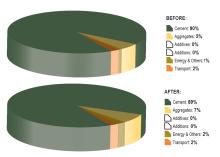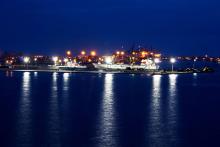An element in the group's comprehensive energy strategy, the fund is financed by the proceeds from the sale of excess CO2 emissions certificates.
Projects for electricity generation by means of waste heat recovery, wind power and alternative fuels as replacement of fossil heat carriers have already been approved, and Holcim says it will save around 200,000tonnes of CO2 annually.
Holcim says that while concrete is a highly energy and CO2-efficient building material, production of the intermediate product cement is energy-intensive, with thermal and electrical energy accounting for approximately 40% of the cost of production.
Because the European cement industry currently emits less CO2 than it is entitled to, large sums of money are raised each year from the sale of excess emissions certificates. The reasons for this excess are the sluggish European growth and the industry's endeavours to boost energy efficiency and reduce emissions.
"Holcim allocates these proceeds to a fund to promote energy efficiency, normally some CHF 100 million every year. The fund should help ensure the realisation of innovative projects across the group in the field of heat recovery, the utilisation of alternative fuels and raw materials, as well as wind power and hydroelectricity. The objective is to save fossil fuels and boost energy efficiency, resulting in an improvement in our environmental footprint and a reduction in production costs," says the company, which has produced a list of criteria for the assessment of projects to be financed.
The emphasis is on economic efficiency, the potential to reduce CO2 and the possibility of multiplying innovations speedily and successfully across the group.
"The creation of the fund led to competition between the group companies to produce the best project proposals, and sparked a whole series of new approaches for sustainable energy projects. In 2010 funds were earmarked for five heat recovery plants in Vietnam, India, Romania, Lebanon and Switzerland. Another six projects were approved this year. They include four waste heat recovery units in Canada, Slovakia, Mexico and India, as well as two installations for the utilisation of alternative fuels and raw materials in Germany and France. These facilities will be commissioned in 2013 and 2014."







